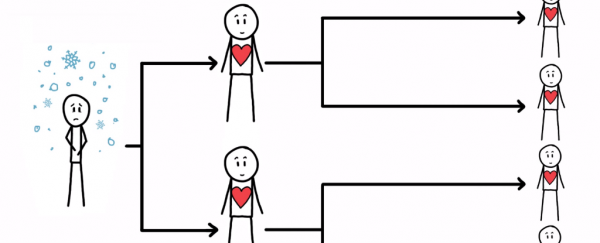A basic understanding of genetic inheritance tells us that only DNA gets passed along to our offspring - traits such as memories, physical scars, and giant muscles cannot be passed on, because they're acquired through life experience, not by altering the genetic code. But recent experimental evidence has challenged this assumption, and scientists now think that our experiences can change the way the genetic code of our children is translated by the body. Welcome to the weird and wonderful science of epigenetics, courtesy of MinuteEarth.
Epigenetics is the study of how our genetics can be controlled by factors other than our DNA sequence, which means information from one generation can be transmitted to the next generation and alter certain traits without affecting their genetic material. So how does this work?
In the video above, we're introduced to an experiment where male mice were taught to fear the smell of fruit by getting an electric shock every time they were exposed to it. Over time, extra neurons sprouted in their noses and in the smell-processing centre of their brains, and this made them super sensitive to the scent.
This isn't exactly surprising - the rats' bodies were responding to a threat, making them better equipped to sniff it out and avoid it. What was strange is when these mice had babies, they were also afraid of the smell of fruit, and they too carried the extra neurons in their noises and brains. As did the babies' babies. So how could this have possibly happened, when the two generations of mouse pups had never been introduced to their dads, or the fruity scent?
As MinuteEarth explains, it's possible for offspring to inherit a trait that their parents learned through experience. It turns out that instilling fear in the father mice did trigger genetic changes, but not in the DNA code itself. Rather, it changed the way instructions in the genetic code were translated and carried out by the body.
In every living cell, there's a genetic code, and according to the information it holds, certain proteins are produced to carry out vital processes. Chemical switches called epigenetic tags are attached to the DNA, and can turn genes on or off, or crank them up or down, so the cells know which proteins to produce and in what quantities.
These switches are epigenetic tags are called that for a reason - they can be altered by factors other than the genetic code. So in the case of the rats, the fathers' bad experience with the fruity smell caused the epigentic tags related to neuron growth in the nose and brain to kick into overdrive, and this was passed on to their offspring, and their offspring's offspring.
How exactly does this happen? Watch the latest episode of MinuteEarth above to find out why it has everything to do with mouse sperm, and how this kind of strange genetic inheritance doesn't just apply to rodents - humans have displayed some pretty amazing cases epigenetic inheritance too.
